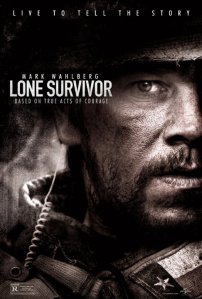 This review reveals story details considered by some to be moderate spoilers.
This review reveals story details considered by some to be moderate spoilers.
Lone Survivor is the true story of a team of Navy Seals whose mission in the mountains of Afghanistan tragically takes a wrong turn. During a reconnaissance stake out, the Seals encounter a small group of goat herdsmen. Following rules of engagement, the Seals let them go despite suspicions that the herdsmen will alert the nearby enemy forces to the Navy Seals’ presence. The soldiers prepare the best they can to be found, but the mountains cripple the team’s radio communication and mobility. The team’s suspicions are correct and they soon are surrounded and a fire fight breaks out. They are chased across the treacherous mountainside, and one member, Marcus Luttrell makes it down to a creek where he is met by a friendly Afghan who helps him to safety, despite Luttrell’s distrust and shock.
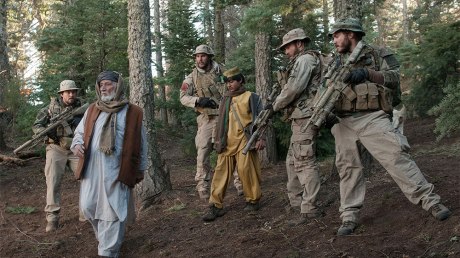
The story of Lone Survivor is not the kind of “based on a true story” that inserts its own storyline into historical events; it is based on the account of real lone survivor Marcus Luttrell, and tries to bring his experience to life in the way he tells the story. Granted, we are dependent on Luttrell’s account because he alone survived to tell the tale. At the same time, despite Peter Berg’s great attempt, it still may be easy for audiences to only see it as “another war action film” and not see the personal reality it has for those involved in the true story and those like it. Personally, I found the action and script to be appropriate for the telling of this story, and in the end very moving.
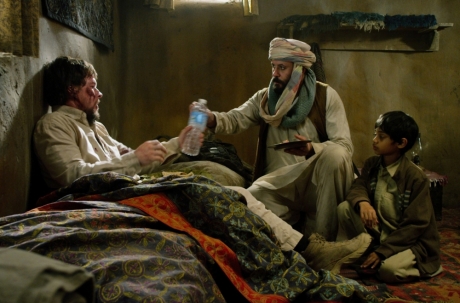
One of my favorite aspects of the film was the treatment and acting of the characters. In many war action films, I find that often the core team of soldiers tends to comprise typed parts as to distinguish them and create a façade of “character.” For example, typically one is “funny,” another is “alpha,” another is “shy,” and so on. The characters in Lone Survivor feel more believable to me, in that they are all well-rounded. They all have moods, relationships, soft spots, hard spots, drive, skills, and so it felt the actors didn’t have to focus on playing a “part” as much as playing a person. It also led to the end of the film being that much more meaningful. I wasn’t just watching characters in a movie; it felt like watching real people on the screen. Of course, Peter Berg stresses this as much as possible by including real-world footage to open and close the film—I completely understand some thinking this was a bit overkill on emphasizing the real-story aspect of the film. The actors did amazing work. Emile Hirsch, Taylor Kitsch, Mark Walberg and Ben Foster all put their souls to their characters, with Hirsch doing particularly superb work. For all the intensity, none of the acting was over-the-top.
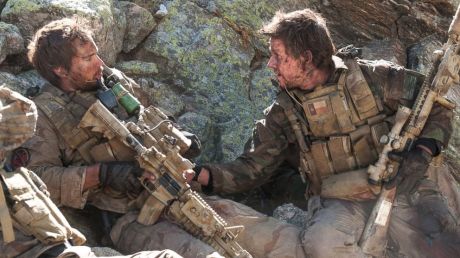
Peter Berg did outstanding work in bringing this story to life, especially having only one man’s account to work off of. He also worked with Director of Photography Tobias Schliessler to immerse us in the moments of the film and the perspectives of the characters. There were times Berg wanted us to feel lost amidst the vast mountains of Afghanistan. Other times we felt the duress of being trapped in tight spaces behind a rock or a tree. In this regard, I would say the visuals in the film are highly appropriate to our immersion into the experience. Beautiful establishing shots are not there simply to revel, but always to help our understanding of where the characters are geographically and emotionally. The feelings he was able to draw out from the actors eyes in throughout the film was also very well done.
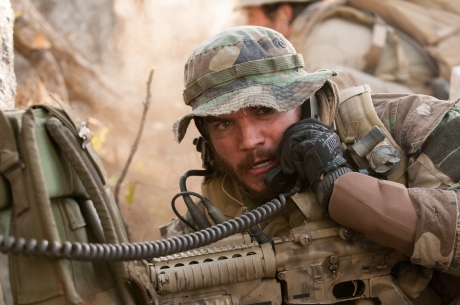
Perhaps the one issue I had was with sound. I think Berg gave us a lot to hear on purpose, bullets whizzing past, rocks crumbling, trees, brush, snakes, and I understand why he would want to make it overwhelming. However, despite my understanding, sometimes I still felt the sound was unbalanced, like we could hear things far away that sounded very close, and it was distracting for me. The music was good, the type of humble-yet-ominous chords you expect from Explosions in the Sky. It helped balance out the high intensity of the fire fights, and added value to moments when characters met their destinies.
Overall, this is not a film to think about, it is one to feel. The ethic is not a principal of truth or a postulation about meaning or purpose or politic. It is feeling the ethos of men who live, fight and die with honor. Not only the soldiers, but the Pashtun people as well. It does not ask audiences to judge right or wrong, but just to feel for a moment living in their shoes, seeing them make decisions and understanding why. I was honored to watch and be a part of that.